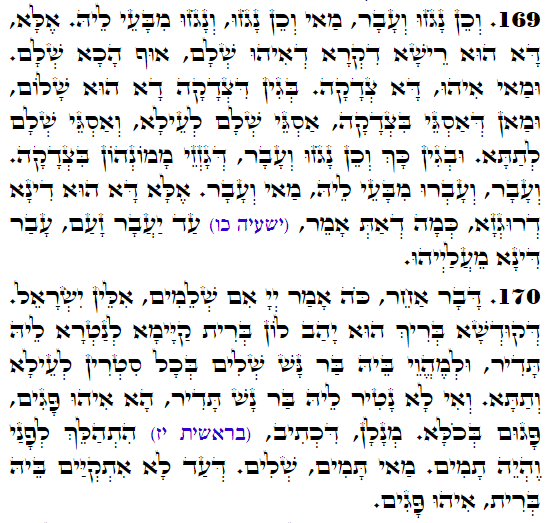Daily Zohar # 4432 – Miketz – Walk before me and be perfect
Daily Zohar 4432

Hebrew translation:
170. דָּבָר אַחֵר כֹּה אָמַר ה’ אִם שְׁלֵמִים – אֵלּוּ יִשְׂרָאֵל שֶׁהַקָּדוֹשׁ בָּרוּךְ הוּא נָתַן לָהֶם בְּרִית הַקֹּדֶשׁ לִשְׁמֹר אוֹתוֹ תָּמִיד, וְשֶׁהָאָדָם יִהְיֶה בּוֹ שָׁלֵם בְּכָל הַצְּדָדִים, לְמַעְלָה וּלְמַטָּה. וְאִם אֵין הָאָדָם שׁוֹמֵר אוֹתוֹ תָּמִיד, הֲרֵי הוּא פָּגוּם, פָּגוּם בַּכֹּל. מִנַּיִן לָנוּ? שֶׁכָּתוּב (בראשית יז) הִתְהַלֵּךְ לְפָנַי וֶהְיֵה תָמִים. מַה זֶּה תָּמִים? שָׁלֵם. שֶׁעַד שֶׁלֹּא הִתְקַיְמָה בּוֹ בְּרִית, הוּא פָּגוּם.
.
Zohar Miketz
Continued from previous DZ
#169
He asks about the meaning of “וכן נגזו” “will be cut down (also, disappeared),” and why it’s not written as “נגוזו” “cut down.” The answer provided emphasizes peace, like Tzedaka, which is peace. Just as the beginning of the verse speaks of peace, so does this part, implying that Tzadaka promotes peace both above and below. The term “נגזו” “cut down” is interpreted as “גזזו” “cut off,” suggesting the shearing or giving of one’s money to charity.
“he passes” “ועבר,” instead of “ועברו” “they pass,” which would be more consistent with the plural form of “נגזו,” it’s explained that “ועבר” refers to the passing of judgment or anger. It’s compared to the phrase “עד יעבור זעם” “until the anger passes” (Isaiah 26:20). Thus, “ועבר” implies that judgment has passed over them or been averted.
#170
Another explanation for the phrase “כֹּה אָמַר יְהוָה אִם שְׁלֵמִים” “Thus says YHVH, if you are whole” (Nahum 1:12). It relates to Israel, to whom the Holy One, Blessed be He, gave the eternal covenant of circumcision (brit milah). This covenant is meant to be perpetually observed, ensuring that a person is complete in all aspects, which are represented by the sefirot Chesed, Gevurah, Tiferet, Netzach, Hod, Yessod, and Malchut (חג” ת נה” י), both above and below. If a person does not continually uphold this covenant, they are considered flawed in every respect. This interpretation is grounded in the biblical verse where Hashem reveals himself to Abram and tells him, “הִתְהַלֵּךְ לְפָנַי וֶהְיֵה תָמִים” “Walk before me and be perfect” (Genesis 17:1). “Perfect” (תמים, Tamim) here means whole or complete, implying that until the covenant of circumcision is fulfilled, a person is considered incomplete or flawed.
Lesson;
The Sefira of Yessod is associated with the reproductive organs, a life conduit. Yessod includes all the Sefirot of Zeir Anpin. Adam was born in a perfect state, but after the sin involving the Snake, men were born with a foreskin that should be removed to restore the ‘perfect’ state. Because it is the first body part to be impacted by the sin, it is the first physical correction that the newborn goes through.
Hashem told Abram to be perfect, and when he circumcised himself, he was called Abraham.
Ishmael was born before Abraham was circumcised, and the outcome was negative. Isaac was conceived after Abraham became perfect, and Sarah received the miracle of a new vessel to bring life. That is why Isaac was righteous.
Men should keep the purity of their channel of Yessod. Women should not allow impure/imperfect penetration into their vessels. Married couples should focus on the unification with purity, unity, and peace to draw blessings into their lives.
{||}

 Previous: Miketz
Previous: Miketz

